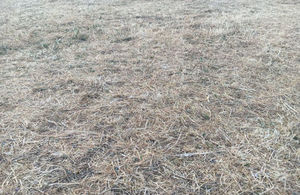National Drought Group – EA Chief Executive statement
The NDG met on Monday 21 October, chaired by Sir James Bevan, Chief Executive of the Environment Agency.

The National Drought Group (NDG) met on Monday 21 October, chaired by Sir James Bevan, Chief Executive of the Environment Agency, to assess the impacts of low groundwater levels in parts of the south east and east England and agree actions to reduce impacts now and into 2020.
The NDG, convened since 2016, brings together government departments, water companies, environmental groups and others to prepare for and mitigate the impacts of drought by coordinating action to maintain water supplies and protect the environment.
Current situation
2019 has seen periods of prolonged low rainfall in parts of England; a trend we have been experiencing since 2016. A dry spring and the hottest day on record in July gave way to high rainfall totals causing widespread flooding in the north of England, whilst in the south and east groundwater levels remain well below normal for the time of year, similar to the droughts of the 1990s.
Despite recent heavy rainfall over recent weeks, the river flows in the chalk dominant areas of Cambridgeshire, Bedfordshire, Essex, Suffolk and Hertfordshire are likely to remain below normal unless sustained winter rainfall provides recovery to the groundwater below.
Environmental drought
This year environmental drought is having a damaging impact on the ecology in some vulnerable chalk streams, exacerbated by the cumulative effect of patterns of low rainfall since 2016. Dry weather and sustained low river flows have also significantly limited access to water for farmers and growers this year, particularly in East Anglia. Whilst sections of chalk streams regularly stop flowing during drier periods (ephemeral reaches), low groundwater levels are causing longer stretches than normal to dry up, and for longer periods of time. Another dry winter could lead to longer reaches of dry and fragmented river channel, increased weed and algal growth and a greater numbers of incidents on fish and wildlife.
Through the National Drought Group, the Environment Agency is working with the water industry, the NFU and environmental organisations to ensure that action is taken now and into 2020 to sustain water resources and protect the environment. This is a difficult task that requires collaborative working across sectors.
Water supplies
Although public water supply has remained relatively resilient in 2019, insufficient groundwater could threaten supplies in some areas next year. Two water companies have highlighted a high risk to their supplies if we receive less than 80% of the expected winter rainfall. Should we not see the level of rainfall needed to sustain supplies this winter, drought measures including drought permits could be needed and temporary restrictions on customer use in spring 2020. The water company actions set out at the NDG include:
- continuing to promote and target water efficiency and metering, including widening campaigns to target specific zones or groups of customers
- targeted action to find and reduce leaks
- optimising and investigating options for bulk transfers to provide support in drought sensitive areas
- engagement with neighbouring companies through regional groups
- taking forward a range of other work to increase the resilience of their networks, including bringing unused sources online and testing water standards
- working with farmers locally to identify ways to sustain and share water supplies
- ensuring that all potential sites are application-ready for drought permits.
Environment Agency
The Environment Agency has committed to:
- continuing its enforcement activity to ensure abstractors comply with their licences to help minimise the impact on the environment
- reviewing local drought interventions with local partners to more actively communicate the environmental situation and responses as part of our preparations for a potential fourth dry winter
- extending flexible abstraction licensing policy into the winter which will include allowing farmers to abstract water in October when there is sufficient environmentally sustainable flow in rivers
- ensuring water companies are following and, where required, updating drought plans in preparation for the managing the impacts of a dry winter
- continuing with our long-term strategic approach to build environmental resilience by reducing pressures at the catchment scale.
Is this climate change?
We are already seeing the effects of the climate emergency including more extreme weather patterns and extended dry and intense wet periods. Through our sector-wide campaign Love Water, the NDG reaffirmed its core message to the public to use water wisely as we all have a role to play in tackling and adapting to the effects of drought.
Action plan and next steps
The National Drought Group has agreed a set of specific actions to mitigate the impacts of dry weather. No one can confidently forecast whether all these actions will be needed next year or in future years, or which sector will see the greatest pressure but we know that we must be ready for whatever scenario plays out.